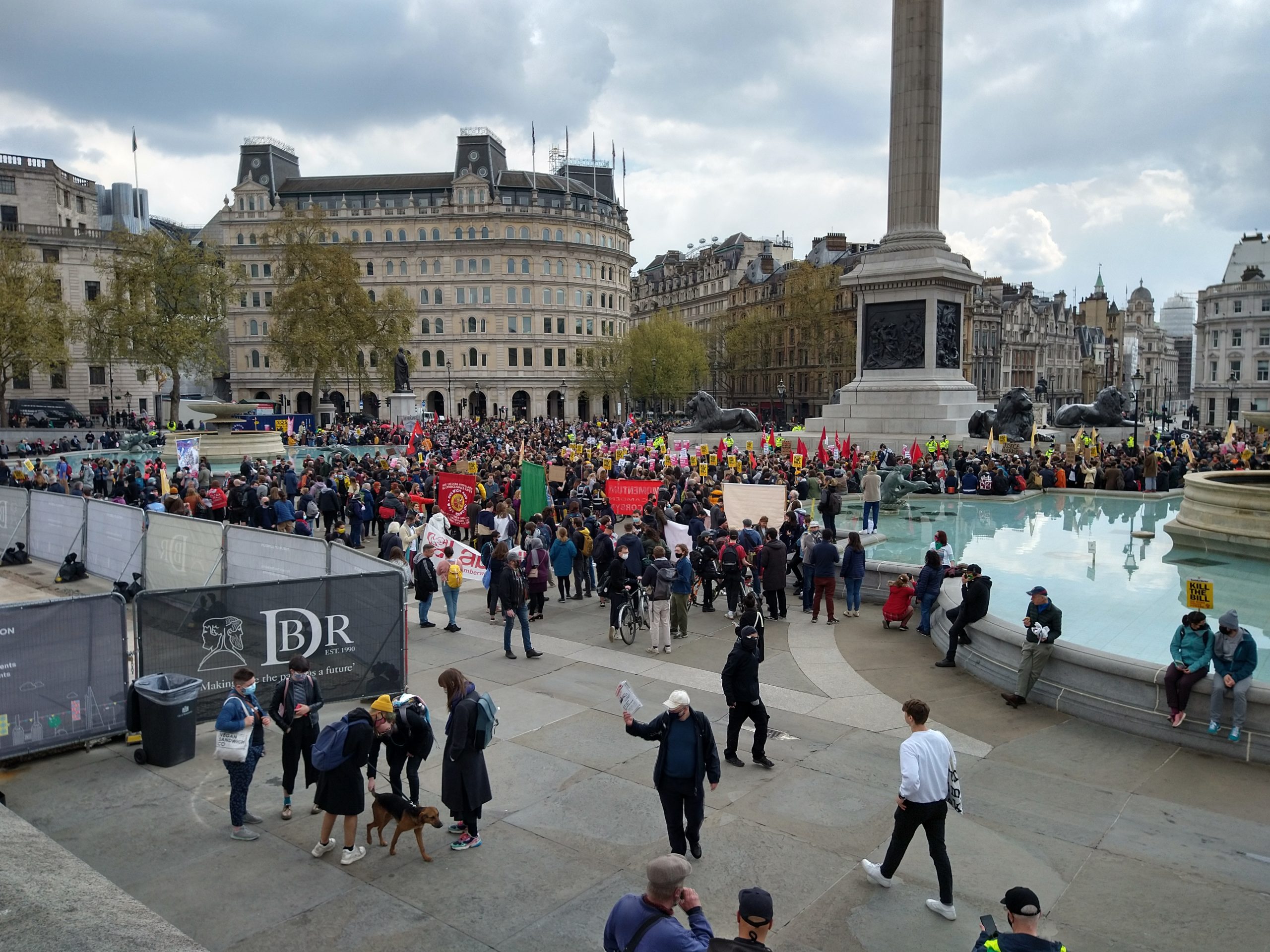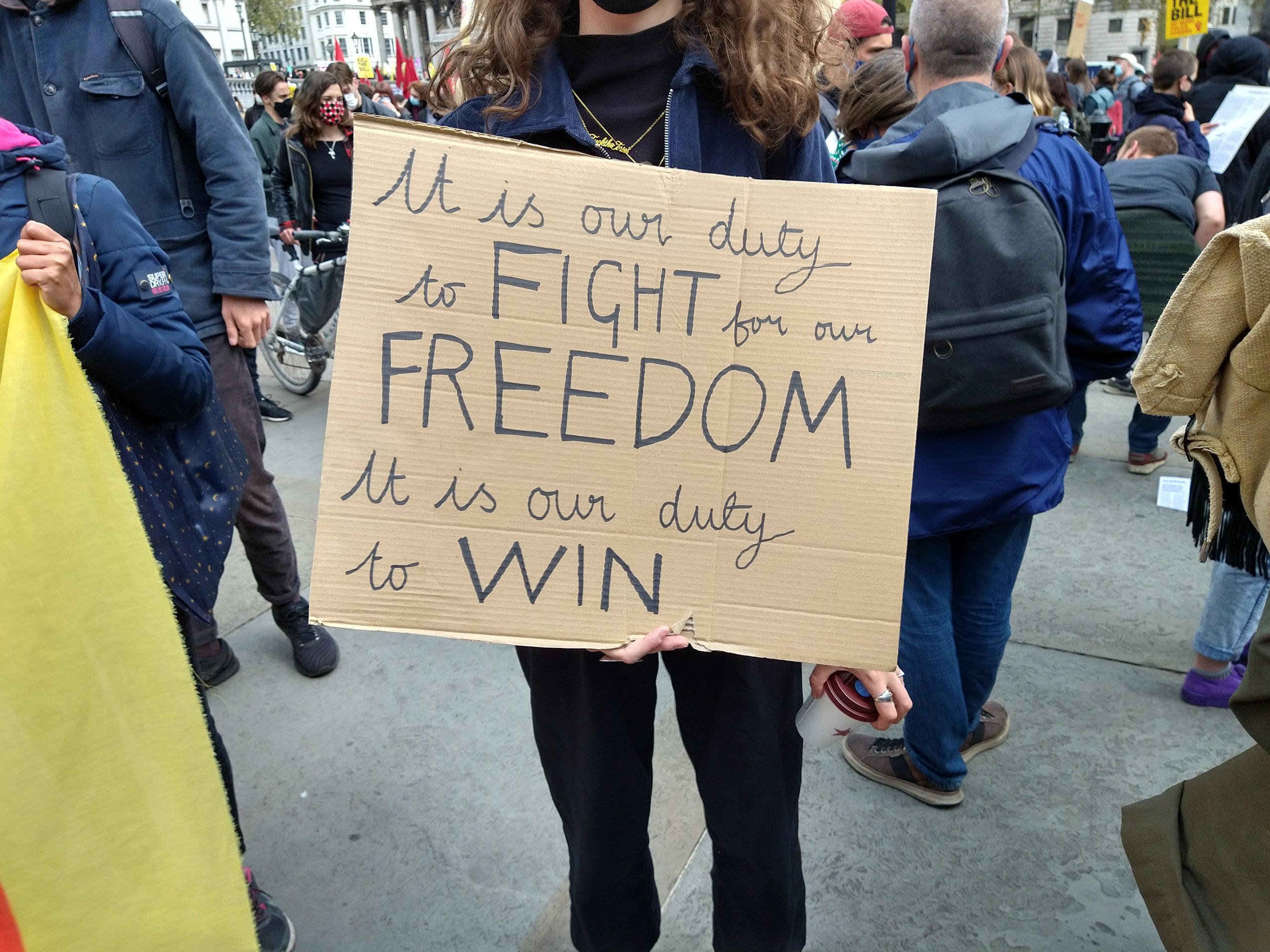by Travis Blute
1st May is traditionally tied to worker and radical demonstrations. This year, central London became the focal point for opposition to a proposed law that would criminalise many protest activities which are presently legal under UK law. It contains harsh new penalties for what are common, historic means of protest.
The bill comes in response to the large protests in recent years by the climate activists, Extinction Rebellion, and last summer by the Black Lives Matter movements, both of which caught the police off guard with their spontaneous, mass characters. Conservative Home Secretary Priti Patel is trying to ensure this will not happen again by the recent introduction of the Police, Crime, Sentencing and Courts Bill to Parliament.
The radical collective Sisters Uncut called this May Day’s “Kill The Bill” protest, which, while it had the traditional left both inside and outside the Labour Party and the big trade unions in attendance, was mostly composed of independent types. The independents are easily identified, as they will carry placards handed out by the left but rip off the identifying names of the groups that produce them, or, alternatively, bring their own homemade placards.
It was a relatively small gathering, given the seriousness of the issue, but it was very diverse and lively. Organizations included everything from Palestinian Solidarity, Campaign for Nuclear Disarmament (CND), Women Against Rape, Sex Workers Advocacy and Resistance Movement (SWARM), LatinX, the Black Revolutionaries, and United Voices of The World.
The youth on this and other recent protests are more militantly opposed to the police than the old left, with the ACAB (All Cops Are Bad/Bastards) meme very much in evidence. The movement for Black Lives, and the other movements that have confronted naked state violence, have radicalised many of the younger generation.
The recent murder of Sarah Everard in London, allegedly by a serving police officer, has deepened the suspicion of those who we are told are there to protect us. This suspicion was further cemented when police were heavy-handed with the women who were conducting a peaceful vigil on Clapham Common, near where Sarah Everard was believed to have been taken. One of the Sisters Uncut speakers in the rally said, “You don’t have to talk to the police when they stop you; it is ok for you to just walk away from them”. This attitude of defiance got a big cheer from the crowd.
The most interesting aspect of these new protests is the way they take the viewpoint of the most marginal and oppressed in society as the standard by which society should be judged. Another platform speaker, a young white woman, said, ‘If you are Black or a sex worker or a migrant, you already know what the police “looking out” for you means. This bill increases the authority of the police to treat all of us who have any problem with how this society works, just as badly.’ This linking up and acknowledgement of what, from the outside, could appear as separate struggles, is in the DNA of young activists operating now.
Some examples of the authoritarian measures contained in the Police, Crime, Sentencing and Courts Bill are:
- Clause 46 – Up to 10 years in prison for damage to a statue.
- Clause 55 – Police to control when static demonstrations start and finish, and £2500 fines for using a sound system.
- Clause 57 – £5000 fines for using megaphones outside Parliament. Protests banned from streets around Parliament.
- Clause 59 – Banning of ‘disruptive’ protests, and making ‘serious annoyance’ a crime carrying a potential prison sentence of 10 years.
- Clause 60 – Gypsy and Traveller vehicles can be seized, and occupants can receive three months prison or £2500 fine for living as a traveller.
This bill, if it becomes law, would be a major attack on all our rights, but the resistance to it should grow as its contents become more widely known.




It was disappointing to see how few people turned out, given the importance of defeating the bill. The self-made sign sums it all up.
Looking at the clauses of the bill, they are quite childish, made by people who are bothered by protests. What is not childish, however, is the penalties the clauses carry. We cannot get have it any clearer that laws are made by those in power, to protect them from criticism and protest.